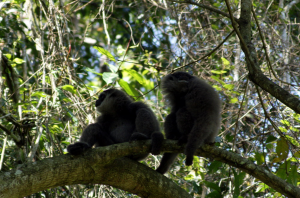Exciting news from Indonesia! The Javan Gibbon Rescue and Rehabilitation Center (JGC) is getting ready to release their second pair of Javan gibbons!! Sadewa and Kiki will be released this June into Gunung Puntang-Mt. Malabar Protected Forest in Bandung, West Java. They are the second pair of Javan gibbons to be rehabilitated and released by JGC.
Sadewa and Kiki were one of three pairs of Javan gibbons I observed for my MA research at JGC in 2009. Both gibbons were rescued from the illegal pet trade and were brought to JGC in 2007. They are a well-bonded pair that exhibited all of the necessary behaviors that will be beneficial for their survival in the wild. They showed a marked preference for wild fruit and foliage, spent very little time in the lower level of their enclosure, engaged in relatively high levels of social behavior, and were observed copulating by the staff of JGC. It is hopeful that once released they will adapt to their new life in the wild and successfully reproduce.
The majority of Javan gibbons held in captivity in Indonesia are directly derived from the wild, as opposed to captive breeding programs, including the individuals who are in zoos and wildlife rescue centers. When infant gibbons are removed from the wild, it is usually after their mother (and perhaps other family members) have been shot and killed. This has potentially detrimental effects on the wild Javan gibbon population because aside from the young gibbons being removed, viable female gibbons are also being removed from the total population. Furthermore, if the infant does survive the pet trade and become a household pet, it will most likely never have the opportunity to reproduce and contribute to any population of wild Javan gibbons.
The purpose of any reintroduction program should be thoughtfully weighed against the costs and benefits of alternative conservation strategies, including protection of the wild population. Rehabilitation and reintroduction of former pet gibbons can potentially serve to make a considerable contribution to the reestablishment of viable wild populations, as well as reduce significant welfare issues for gibbons already living in rescue centers. If rehabilitation and reintroduction programs adhere to scientific principles and guidelines, coupled with careful planning and documentation of the pre- and post-release behavior of the animals, the programs can positively contribute to species’ conservation and habitat protection.
Best of luck Sadewa & Kiki!
-Jaima


Good luck Sadewa & Kiki! So excited for them.